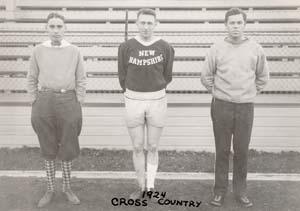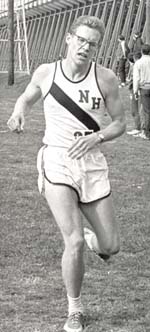 |
 |
| current issue |  |
past issues |  |
send a letter/news |  |
address update |  |
advertise |  |
about us |  |
alumni home |
Web Extras
|
That Sweet Championship Season
The year that George Estabrook '66 and the cross country team won the Yankee Conference By Richard L. Dunn '66 |
Easy to print version |
 Some of the 1924 country-country team. Paul Sweet is on the right. |
As the school year started in September 1965, Paul Sweet had been track and cross country coach at UNH for four decades. He could be proud of the fact that four of his runners had been individual champions in the New England intercollegiate cross country meet. Among his trackmen, Edmund Styrna '48 and Richmond "Boo" Morcom '47 had been multiple event winners in the IC4A championship meet. Morcom had gone on to reach the finals in the pole vault in the 1948 Olympics.
Sweet was no stranger to championships both from winning them and missing out on them. He was captain of the University of Illinois track team that won the Big Ten Championship in 1923. He was member of a championship 4x440 relay team. He was also Big Ten individual champion in the quarter-mile run in a time of 48.2 seconds, nearly two seconds faster than Horatio Fitch ran in winning the U.S. national championship that year.
One championship Sweet missed out on was the 1924 Olympics. Sweet had to make a choice. He could train for the Olympics, where he would have a good chance of winning the 400 meters, or he could start his coaching career. He could not do both. A coach was considered a professional athlete under the rules at that time and he would have been ineligible to participate in the Olympics. Newlywed Sweet chose to start his coaching career and provide for his family.
 Richard Dunn '66 |

|
The 400-meter race in the 1924 Olympics was immortalized in the 1981 multi-Oscar award-winning movie Chariots of Fire. In the movie and in real life, Britain's Eric Liddell won Olympic gold in the 400 meters. Winning the silver medal less than a second behind Liddell was Horatio Fitch. Had Paul Sweet been there Liddell might have lost and the story would have come out differently.
Four decades of coaching without a conference championship team was probably not on Paul Sweet's mind that fall. There was another season of coaching ahead. One thing Sweet didn't have to worry about was the allocation of scholarship money. There were no scholarships for track or cross country runners. There were athletes to coach, mentor and encourage—encourage to excellence in their sport as well as excellence in academics. As with any other season there were problems and opportunities.
One problem involved some outstanding runners who had graduated in June of that year. Jeff Reneau '65 and Don Dean '65 (UNH record-holders in the 2 mile and 1 mile, respectively) had been excellent cross-country and middle-distance runners. Their experience, along with that of other graduating seniors, had been lost. For the 1965 season Sweet could count on only two seniors. George Estabrook '66 would undoubtedly be his best harrier. Rick Dunn '66 had been plagued by injuries and was inconsistent. Interestingly, Estabrook had not run track or cross country until he was a junior in high school. Dunn had not run competitively until his senior year in high school.
An opportunity involved the previous year's freshman cross-country team, which had been the best in recent memory and possibly the best ever for UNH. George Estabrook's brother Bob '68 was among a crew that included Rick Bell '69, Charlie Morrill '68, Mark Springate '68 and Steve Young. With the two seniors, this added up to seven runners. In cross country, the low score wins. Five runners count in making a team's score. A perfect score is obtained by finishing 1-2-3-4-5 for 15 points. Two other runners count in adding to the opposing team's score. If the team's next runner finishes 6th, the lowest score the other team's first runner can get is 7. A cross-country team can field other runners and UNH had a few more, but only the first seven to finish have an impact on the outcome. While his team was small, had enough runners to score winning points and add to opposing teams scores.
Page: 1 2 3 4 Next >Easy to print version
blog comments powered by Disqus

